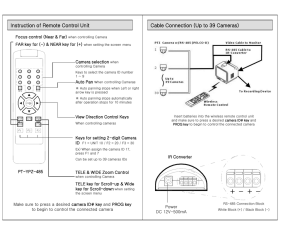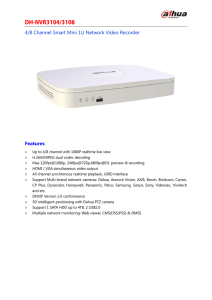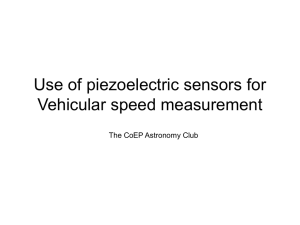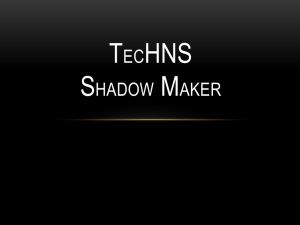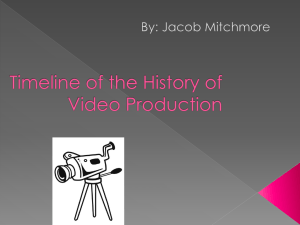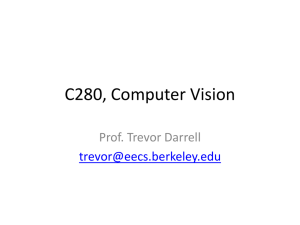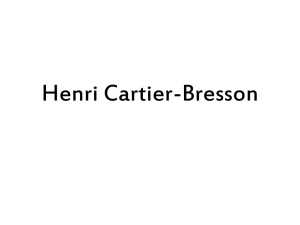Anna Mason Motion Tracking
advertisement
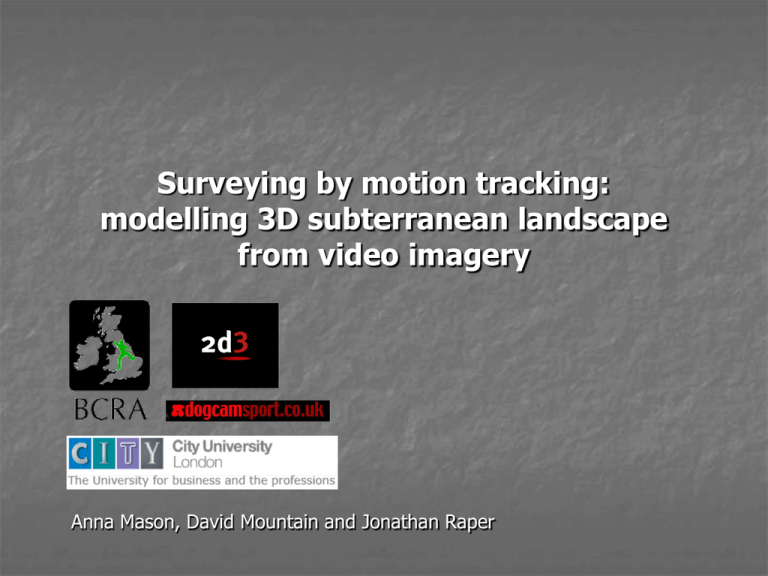
Surveying by motion tracking: modelling 3D subterranean landscape from video imagery Anna Mason, David Mountain and Jonathan Raper Study Areas 1. Requirements 3. Field Work 2. Equipment Tests Conditions a caver might experience… Dirty Wet Dark Confined Foggy Camera Tracking and Line Surveying Bullet camera Line Survey Records: 1. Cave passage dimensions 2. 3D shape for vertical and horizontal transects 3. Reliable visual reference Records: 1. Absolute distance, bearing and inclination 2. Vertical and horizontal dimensions 3. Field sketches of shape Camera tracking with 2D3’s Boujou4 Calculates optimal estimates of camera rotation and movement in relation to objects as they are tracked throughout an image sequence Offers: 1. Automatic tracking or interactive tracking 2. Tracking with environmental markers or without Cluster of 3D points on a marker Data captured using bullet camera & Boujou4, Chislehurst Caves b) 2D view a) Bend caused by correction of lens distortion 2D Feature Tracking 3D view c) User defined coordinate plane Gap indicating a passage junction Camera tracking might not always be effective Smooth curved surface If there are few points for a corner detection algorithm to detect Could use: Scene manipulation before filming Interactive feature tracking eg. POIs, survey data, CAD model Camera information Colour correction of imagery – not recommended, but may make difficult imagery useable How can you tell? Spikes Noisy camera path Cameras in odd places Not good Virtual camera positions do not reflect the real world camera’s true direction or path travelled Noisy camera path High reprojection errors Camera tracking using Boujou4 c) Start point First Frame Last frame Camera path Camera path follows the direction and path the real world camera travelled. Camera path noise realistically reflects the terrain 3D Polyface Meshes a) 3D view of a mesh in Boujou4. b) The same mesh mapped to the line survey results (red and blue lines) in GIS. 3D modelling, Chislehurst Caves Results Upwood Air Shaft Highclere Air Shaft 0 0.06 0.12 0.18 KM © Crown Copyright Ordnance Survey 2008 Mine passage connecting Upwood Shaft to Highclere Shaft at Chislehurst, Bromley Scale differences range 0.2cm to approximately 20.3cm. Mean of four measurements was 13.3cm. Within 10-15% of the exact measurements suggested as acceptable when sketching cave passage shape (Day, 2002). Cave survey sketches Vs 3D meshes Club Rooms, Chislehurst Air Shafts, Chislehurst Gaping Gill, North Yorkshire Field Sketches Vertical Cross Sections Shallow half ellipse Arched ellipseTypical star shaped phreatic cave morphology Study Areas 1. Requirements 3. Field Work 2. Testing Equipment Camera Tracking and Line Surveying Line Survey Bullet camera Records 3D shape for vertical and horizontal transects Reliable visual reference Records absolute distance, bearing and inclination measurements Accurate representation of shape Accurate measurement of dimensions /volume Accurate measurement of relative scale Benefits to GIS and Caving New source of 3D data Low cost accurate surveying technique compatible with GIS, CAD Animation, AR, VR and Visualisation software Further Studies Camera tracking research, eg. Exploration rovers in hostile environments Robotic surgery Navigation Animation Virtual TV Comparison with laser ranging and finding equipment Compatibility with cave surveying software Test more equipment, eg. infrared Limitations Image Quality Camera lens and light must be tailored to fit the scene: References 6mm fixed lens and 6degrees Scale must be defined by the user Use h or d or a marker Optimal camera moves create parallax Dolly rather than pan Tracking corners Begin/end with survey stations Price ? DAY, A.J., (2002) Cave Surveying – A guide to the equipment, techniques and methodology of the BCRA system, Cave Studies Series No.11. Buxton, UK: British Caving Research Association (BCRA) DOBBERT, T. (2005) Matchmoving: The invisible art of camera tracking, Sybex Inc., Alameda, CA HARTLEY, R. and ZISSERMAN, A. (2004) Multiple View Geometry in Computer Vision (Second Edition), Cambridge, UK: Cambridge University Press Acknowledgements BCRA, 2D3, David Mountain and Jonathan Raper (City University), John Farrer (Peak Cavern), Terry Hunt (Chislehurst Caves), Craven Potholing Club (Peak Cavern), Adam Evans, Rod Legear, Paul Chambers Thank you


